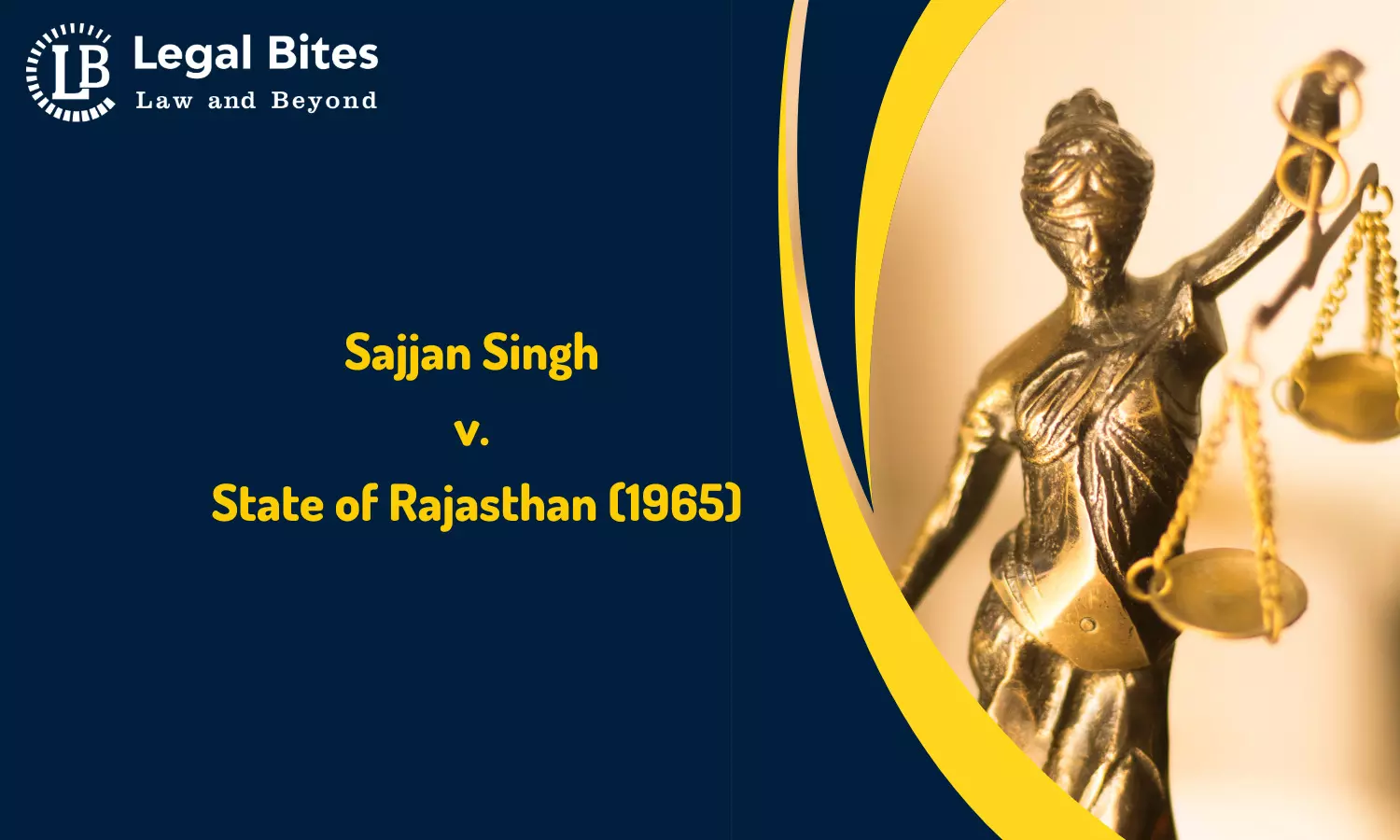Case Analysis: Sajjan Singh v. State of Rajasthan (1965) | Validity of 26th Constitutional Amendment
The 'Case Analysis: Sajjan Singh v. State of Rajasthan (1965)' contains a landmark judgment pertaining to the power of Parliament regarding the amendment of any of the provisions of the Indian Constitution.

The 'Case Analysis: Sajjan Singh v. State of Rajasthan (1965)' contains a landmark judgment pertaining to the power of Parliament regarding the amendment of any of the provisions of the Indian Constitution.
Case Title: Sajjan Singh v. State of Rajasthan
Court: Supreme Court of India
Citation: AIR 1965 SC 845
Judges: P. B Gajendragadkar, K. Subba Rao, K.N Wanchoo, M Hitayatullah, J. C Shah
Date: 31st March 1965
Facts
Ratlam, a princely state that eventually joined the Indian Union, was governed by Sajjan Singh. Sajjan Singh and the Indian government entered into a contract in 1949 that gave him a number of rights and privileges, including the ability to receive a yearly privy purse. The Constitution (26th Amendment) Act, which was passed in 1954, removed the rulers of the former princely states' privy privileges and privy funds. In the Supreme Court, Sajjan Singh contested the legality of the 26th Amendment Act, claiming that it infringed on the fundamental rights that the Indian Constitution had provided to him.
Issue Raised
1. Whether a modification to a fundamental right within Article 368 qualify as "law" as per Article 13 (2)?
2. Can a fundamental right in part III of the Constitution be amended by Parliament in any way within Article 368?
3. Whether the 26th Amendment Act, which eliminated the princely rights and privy funds of the former princely state rulers, have legal standing?
Laws Applied
Article 31B of our Indian Constitution says,
"Without prejudice to the generality of the provisions contained in Article 31A, none of the Acts and Regulations specified in the Ninth Schedule nor any of the provisions thereof shall be deemed to be void, or ever to have become void, on the ground that such Act, Regulation or provision is inconsistent with, or takes away or abridges any of the rights conferred by, any provisions of this Part, and notwithstanding any judgment, decree or order of any court or tribunal to the contrary, each of the said Acts and Regulations shall, subject to the power of any competent Legislature to repeal or amend it, continue in force."
Article 368(1) of the Indian Constitution says,
"Notwithstanding anything in this Constitution, Parliament may in exercise of its constituent power amend by way of addition, variation or repeal any provision of this Constitution in accordance with the procedure laid down in this article."
Article 13(2) says,
The State shall not make any law which takes away or abridges the rights conferred by this Part and any law made in contravention of this clause shall, to the extent of the contravention, be void
Article 32(1) says,
" The right to move the Supreme Court by appropriate proceedings for the enforcement of the rights conferred by this Part is guaranteed."
Judgment
The Supreme Court of India confirmed the constitutionality of the 26th Amendment Act, which eliminated the princely privileges and privy funds of the rulers of the former princely states, in Sajjan Singh v. State of Rajasthan. The phrase "amendment of the Constitution" clearly and indisputably refers to changing all of the Constitution's clauses. The Court further said that the word "law" in Art. 13(2) does not include a law passed by Parliament by virtue of its constituent power to amend the Constitution.
The Indian Constitution, which guarantees equality before the law and forbids discrimination based on birth, and democratic values were found to be incompatible with princely privileges and privy purses, according to the Indian Supreme Court.
The Court pointed out that treaties with the British government had conferred the princely monarchs' rights and powers, and that they did not have a particular birthright to such things. The Indian government had every right to eliminate princely rights and privy funds in order to incorporate the princely states into the Indian Union, as opined by the Indian Supreme Court.
The Court further ruled that because royal privileges and privy purses were never regarded as rights in the first place, their elimination did not infringe on the fundamental freedoms protected by the Indian Constitution. The judgment enhanced the position of the Union government in relation to the former princely state rulers and had broad repercussions for the process of integrating the princely states into the Indian Union.
Impact of the judgment is as follows:
Abolition of Princely Privileges and Privy Purses: The Indian Government's decision to abolish the princely privileges and privy purses of the former princely states was affirmed by the Supreme Court. This choice cleared the door for a more democratic and egalitarian society and was vital in bringing princely kingdoms into the Indian Union.
Protection of Democratic ideals: The Supreme Court's ruling established the supremacy of the Constitution over all other laws and agreements, upholding the democratic ideals of equality and nondiscrimination. This improved the Union government's standing with respect to the former princely state kings.
Strengthening of Fundamental Rights: The Sajjan Singh case verdict made clear the depth of the Indian Constitution which guarantees fundamental rights guarantees. The Court determined that because the privy purses and princely privileges were never viewed as fundamental rights in the first place, their elimination did not infringe any fundamental rights.
Historical Significance: The Sajjan Singh case verdict was a significant ruling in the evolution of India's Constitution. It significantly influenced how the Union Government interacted with the former princely state lords and contributed to the development of a more democratic and egalitarian society in India.
The Sajjan Singh v. State of Rajasthan case, which strengthened the democratic values of equality and non-discrimination, also paved the path for a more democratic and egalitarian society and thus had a significant impact on the overall development of the Indian Constitution.
Contributions from: Dikshita More And Apurva Neel


